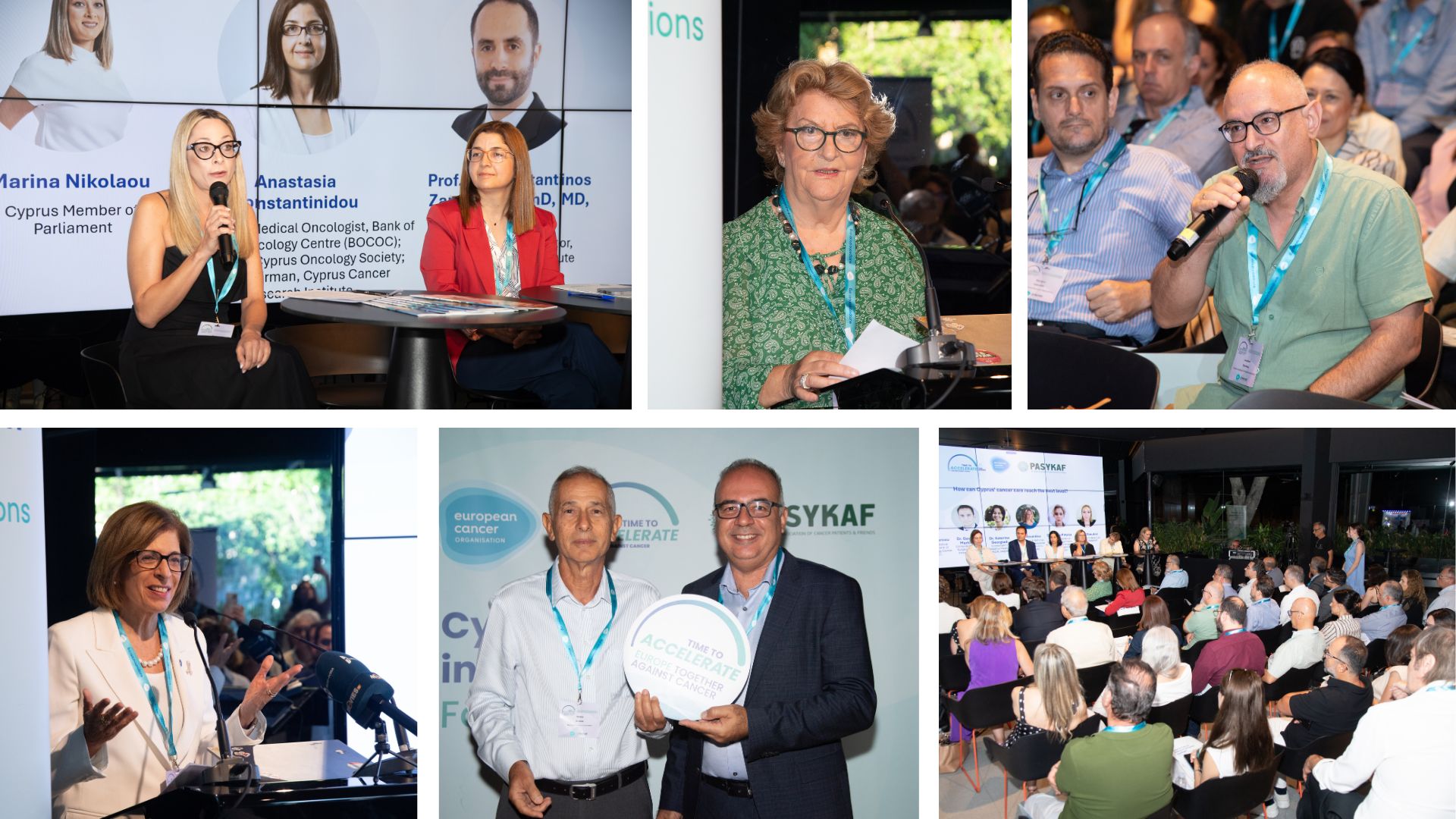Why are so many Cypriots dying needlessly from cancer?
Each year, more than 4,500 Cypriots are diagnosed with cancer, and more than 2,000 die from the disease. It does not have to be this way.
Cyprus has made real progress in cancer control, but long-standing gaps still cost lives. Maintaining the status quo is not an option.
Urgent action is needed!
The ‘European Cancer Pulse Country Report on Cyprus’, released today by the European Cancer Organisation (ECO) in partnership with the Cyprus Association of Cancer Patients and Friends (PASYKAF), identifies a range of alarming issues that need to be addressed promptly, including:
- Risk factors: An estimated 23% of the Cypriot population smokes daily, well above the EU average. Tobacco control policies here remain looser than elsewhere, ranking 28th out of 37 European countries. The result: Cyprus experiences 6% more lung cancer cases than the EU average, nearly 1 in 5 cancer deaths in the country.
- National Cancer Strategy: This strategy, dating back from 2019, ranks only 17th among national cancer plans in the European region. It struggles with adequate financing, prevention, health equity, emergency preparedness, and needs stronger alignment with European goals on cancer prevention and patients and survivors’ quality of life.
- Screening gaps: Although recommended for all EU countries since 2003, Cypriot screening programmes for cervical and colorectal cancer have been extensively delayed, resulting Cyprus struggling with some of the lowest screening rates in Europe. The recent start of the colorectal cancer screening programme needs to be the start of a new era in cancer care.
- Social inequalities: As a result of opportunistic screening practices and high out-of-pocket expenses, women with very low incomes are three times less likely to be screened for cervical cancer than those with high incomes. The evidence is clear: a wide variety of inequalities is impacting cancer incidence and outcomes across the country.
- Health workforce imbalance: Cyprus has fewer nurses than other European countries compared to its numbers of physicians and cancer cases. This imbalance can affect the quality of care patients receive and makes it more difficult to reform the health system to be more sustainable and flexible.
The creation of the National Cancer Institute and the upcoming Cyprus Presidency of the EU Council of Ministers provide a critical opportunity for Cyprus to accelerate momentum on its National Cancer Strategy and set more ambitious policy objectives. This might include:
- Adopting a minimum age for tobacco sales of 21 (‘tobacco 21’) and banning the sales and delivery of tobacco products to people born after 1 January 2012 to achieve a tobacco-free generation by 2040;
- delivering new regulation to protect citizens from second-hand smoke in outdoor locations such as playgrounds, restaurants, and beaches.
- Accelerating implementation of a national cervical cancer screening programme, ensuring higher targets of breast cancer screening uptake are achieved and joining pan-European efforts to improve access to lung cancer screening.
Nicolas Philippou, Chief Executive Officer of PASYKAF, says:
 ‘PASYKAF calls for targeted investment, especially in prevention, education and research on cancer, unified national cancer strategies in a fragmented landscape under Comprehensive Cancer Networks, acceleration of implementation of screening programs and patient-centred policies to ensure that every person with cancer can live with dignity, support, and access to equal care. Patients must remain at the centre, and our role as their voice is more vital than ever.’
‘PASYKAF calls for targeted investment, especially in prevention, education and research on cancer, unified national cancer strategies in a fragmented landscape under Comprehensive Cancer Networks, acceleration of implementation of screening programs and patient-centred policies to ensure that every person with cancer can live with dignity, support, and access to equal care. Patients must remain at the centre, and our role as their voice is more vital than ever.’
Andreas Charalambous, Past-President of the European Cancer Organisation, says:
 ‘The EU Beating Cancer Plan presents a strategic opportunity for Cyprus to move toward the development of a Comprehensive Cancer Centre (CCC). While the country faces notable constraints, including limited infrastructure and relatively low system maturity, these challenges can be addressed through strengthened collaboration among healthcare providers. By fostering coordinated efforts and leveraging European support, Cyprus can enhance its cancer care ecosystem and take significant steps toward establishing a CCC within its national context.’
‘The EU Beating Cancer Plan presents a strategic opportunity for Cyprus to move toward the development of a Comprehensive Cancer Centre (CCC). While the country faces notable constraints, including limited infrastructure and relatively low system maturity, these challenges can be addressed through strengthened collaboration among healthcare providers. By fostering coordinated efforts and leveraging European support, Cyprus can enhance its cancer care ecosystem and take significant steps toward establishing a CCC within its national context.’
Stella Kyriakides, Former EU Commissioner for Health and Food Safety, and the other expert speakers reunite for Cyprus Cancer Policy in European Spotlight: Forging Collaborations.


